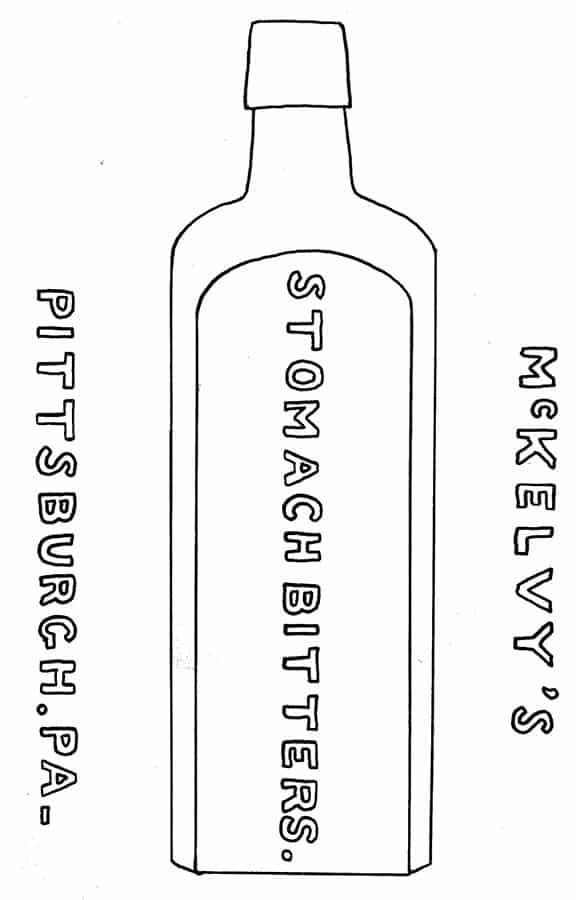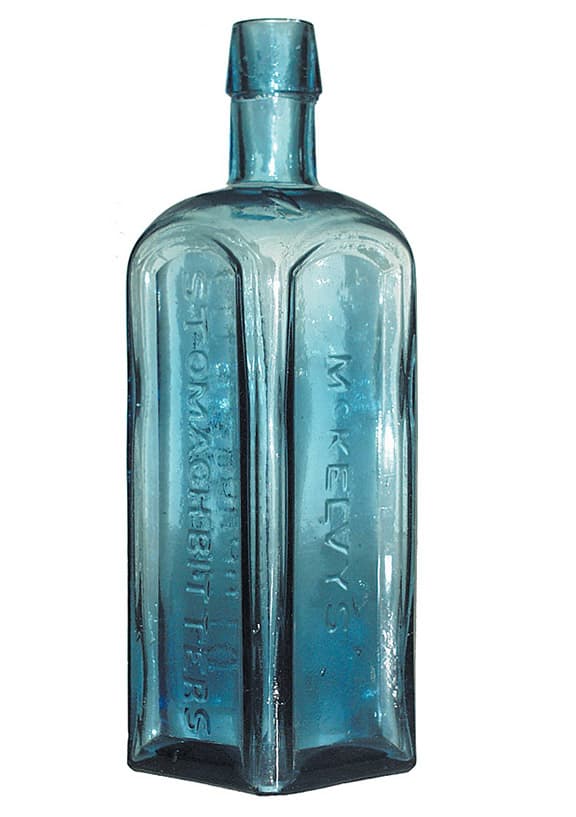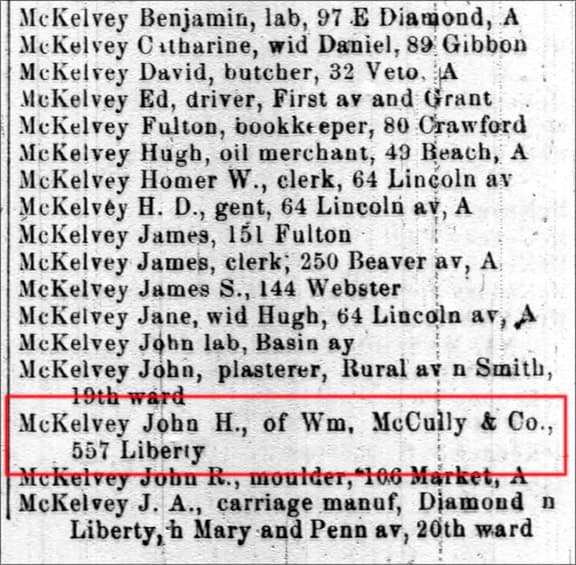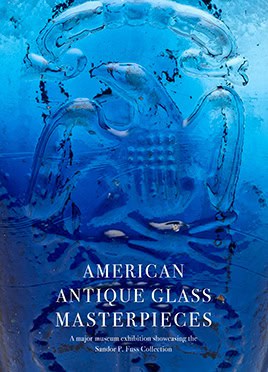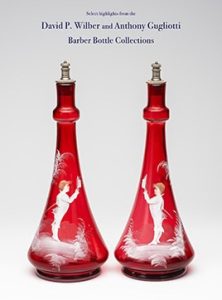McKelvy’s Stomach Bitters – Pittsburgh, Pennsylvania
Aqua and Cornflower Blue
14 February 2015
![]() Sometimes there is just so little information available to help identify a bottle that you just have to connect the dots and make assumptions. In today’s case it is the McKelvy’s Stomach Bitters from Pittsburgh, Pennsylvania. We also have WM. MCC&CO. embossed on the base as clue.
Sometimes there is just so little information available to help identify a bottle that you just have to connect the dots and make assumptions. In today’s case it is the McKelvy’s Stomach Bitters from Pittsburgh, Pennsylvania. We also have WM. MCC&CO. embossed on the base as clue.
The Carlyn Ring and W.C. Ham listing in Bitters Bottles is as follows:
M 59 McKELVY’S STOMACH BITTERS
McKELVY’S // STOMACH BITTERS. // PITTSBURGH. PA. // f // b // WM. MCC&CO.
8 1/2 x 2 3/4 (6 3/4)
Square, Aqua, Cornflower Blue, Applied Mouth, Extremely rare *color needs to be added.
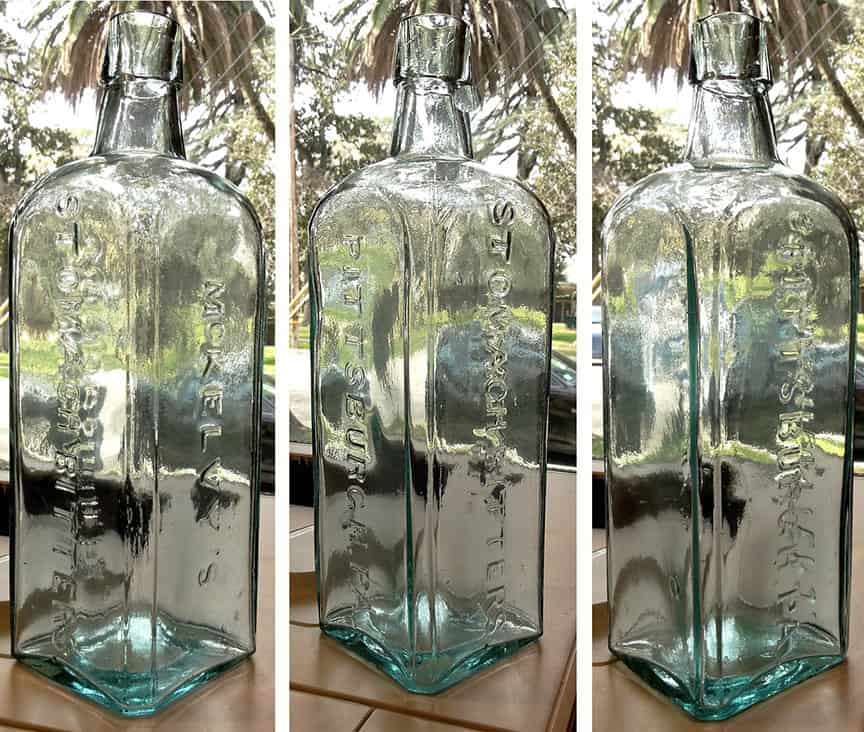
Extremely rare, aqua McKelvy’s Stomach Bitters – Jeff Wichmann at American Bottle Auctions (Sale Page). This will be joining the cornflower blue example.
Clues
The initial listing I found (see below) was for S. McKelvey, jr., stomach bitters located at 653 Penn in the 1872 Pittsburgh City Directory. This is about the right date for the McKelvy’s Stomach Bitters but note the name is spelled wrong with an additional “e”. Further searches reveal a H.R. McKelvy at 653 Penn, and a Samuel McKelvy Jr., liquor dealer at 653 Penn in the 1870 and 1871 Pittsburgh City Directories. The name is spelled correctly here. I found a number of errors in spelling with the McKelvy and McKelvey name. Tough to be a typesetter. Maybe he was drinking some bitters.
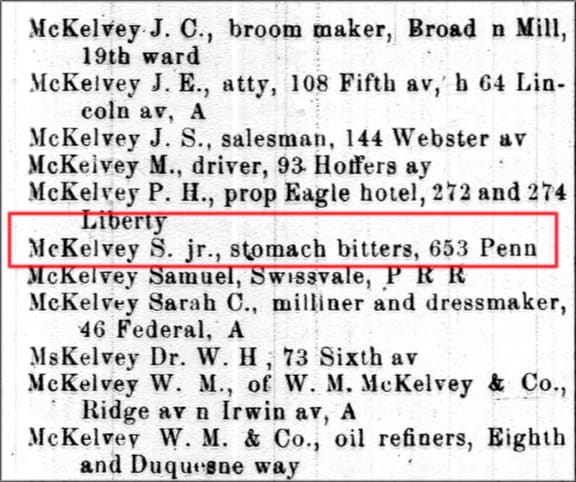
S. McKelvey, jr., stomach bitters listing. I believe his name is misspelled here with an additional “e” – 1872 Pittsburgh, PA City Directory
The second listing below is for a John H. McKelvey of Wm. McCully & Co. from the 1872 Pittsburgh, PA City Directory. “WM. MCC&CO.” is embossed on the base of these bottles. That is the glass house making the bottles.
Samuel McKelvy, Jr.
OK, if your name is Samuel McKelvy, Jr. and you are a liquor dealer and bitters manufacturer, there must be a Samuel McKelvy, Sr, or dad. I believe, when I connect the dots, the father is Colonel Samuel McKelvy.
Colonel Samuel McKelvy
Col. SAMUEL McKELVY was born May 1, 1814 in Pittsburgh, Pa., son of Hugh McKelvy, Jr. The grandparents of our subject, Hugh and Elizabeth McKelvy, came to America in 1796, and brought with them a large family of children: James, John, David, William, Hugh (the father of our subject), Mrs. Betsey McCracken, Mrs. Strain and another daughter who came to America earlier. The grandfather came to Pittsburgh in 1796, and rented the farm (where Twenty-eighth street now is) of Col. James O¹Hara. The father of our subject was by trade a brickmaker; was a colonel in the militia, and eventually became a councilman; was also a coal-merchant; politically he was a democrat. He died in May 1835, aged fifty-five years; his wife, nee Nancy McGowan, died aged eighty-four years. Samuel succeeded his father in business, became the founder of the cast-steel business in Pittsburgh, and started the McKelvy & Blair Cast-steel and File Manufacturing Company. He was largely interested in other business enterprises, and was prominently identified with all movements tending to the material progress and development of his native city. In 1855 he had a tract of land in Pridevale, W. Va., of 13,000 acres, on which he had three blast-furnaces in operation. When the war broke out he abandoned business and volunteered for the service. He was early connected with the Duquesne Greys, of which organization he was for a time captain. He was appointed to the commissary department, eventually becoming chief of the commissary of the third army corps, on the staff of Gen. Heintzelman. After the second battle of Bull Run he was placed in charge of the convalescent camp near Washington, D.C., where he did duty until toward the close of the war, when he was appointed chief commissary of cavalry under Gen. Sheridan. He resigned, but Secretary Stanton declined his resignation. After the war Col. McKelvy was appointed United States marshal for the western district of Pennsylvania and took and active part in politics. He was a pronounced democrat and always took a prominent part in the committees and conventions of that party, at one time being chairman of the county committee. He died somewhat suddenly, March 24, 1889, having been in ill health for some years. [History of Allegheny County]
Here is one of Samuel McKelvey’s sons, William Addison McKelvy.
William Addison McKelvy
In 1880, a young man, who had graduated but a few months previously from the Philadelphia Dental College came to Atchison, Kansas, and finding the city to his liking located for practice. The year 1915 finds the same man, now thirty-five years older, or younger, as his friends speak of him, still in the active practice of his profession, and it is said his practice is a leading one in this section of the State. Thirty-five years in Atchison have done much for this man and he has done much for suffering humanity. He is the nestor of the dental profession in northeastern Kansas, one of the widely known and influential citizens of the city and has justly earned the esteem of a large circle of friends and acquaintances; the esteem which slowly develops only through honorable living and kind deeds. His name initiates this review.
William Addison McKelvy was born in the city of Pittsburgh, Pa., June 5, 1858. His paternal grandfather, Hugh McKelvy, emigrated from Ireland about the year 1800. Shortly after reaching America, he located in Pittsburgh and was one of that city’s pioneer brick manufacturers. Dr. McKelvy’s father was Col. Samuel McKelvy, born in Pittsburgh, a member of the firm of Blair & McKelvy, pioneers in the steel industry in that city. He married when a young man, Anna B. Pride, a daughter of David Pride, who was also a pioneer resident of Pittsburgh and a native of Scotland. When President Lincoln issued his first call for volunteers, Samuel McKelvy was among the first to enlist in his home city. He was commissioned captain of the Duquesne Greys, Pittsburgh’s crack troop. He served his country with distinction and was given important assignments and received deserved promotion, being commissioned lieutenant colonel and served on the staff of General Heintzelman and that of Gen. Phil Sheridan. The convalescent camp of the Union army, situated about seven miles south of the city of Washington, was under his charge or supervision during his entire term of service. Following his military service, he returned to Pittsburgh and his steel business. He was one of the first to build a country residence at Sewickley, now famous for its beautiful suburban homes owned by the prominent families of the steel city. The old McKelvy mansion, now owned by the Doctor’s brother, William Henry Seward McKelvy, is known as the Park Place Hotel, and is operated by its owner. Colonel McKelvy died in Sewickley in 1889. To Colonel and Mrs. McKelvy were born nine children of which our subject is the eighth. William Addison McKelvy was reared in his native city and acquired a thorough education in its public schools. He later entered the Philadelphia Dental College and graduated with the degree of Doctor of Dental Surgery, a member of the class of 1880. Following his graduation he returned to Pittsburgh and was engaged in practice for a few months. In November of that year he came to Kansas and located in the city of Atchison on the twenty-fifth of the month. His choice of location was partly due to having in the person of Dr. William F. Ferguson. a well established surgeon of the city, a friend who assured him that Atchison would prove a most satisfactory place in which to build up a practice. Dr. Ferguson assisted in getting him properly started and gave every evidence of a sincere friendship. He had little difficulty in building up a lucrative practice and has for many years past been recognized as one of the leading men in his profession in his section of the State. He is a member of the Kansas City Dental Society, the Kansas State, the Missouri State and the National Dental Associations.
Dr. McKelvy has never neglected his civic duties, has favored those measures and projects which meant a bigger, better city, but has never had time nor the inclination for public office. He has, from the time he graduated given his entire time and attention to his profession. He is a member of Washington Lodge, 104, Ancient Free and Accepted Masons, and Atchison Lodge, No. 647, Benevolent and Protective Order of Elks. Dr. McKelvy has been twice married. His first wife was Miss Ella M. Ferguson, a daughter of Dr. Eli Ferguson, a pioneer physician of Atchison. They were married in November, 1888. Mrs. McKelvy died in 1892. Two children were born to this union: William Ferguson McKelvy, a hardware merchant of Marliton, WV. Va., and Charles S. McKelvy, employed in the wholesale hardware house of Blish, Mize & Silliman, of Atchison. On October 2, 1899, he married Miss Eleanor Cain, a daughter of Alfred D. Cain, a pioneer miller of Atchison and founder of the Cain Milling Company. They are parents of three children: Alfred D., Addison P., and Mona.
Select Listings:
1860: Samuel McKelvey, gent, 651 Penn – Pittsburgh Directory (R. L. Polk & Co.)
1863: Samuel McKelvy, brigade commissary, Hiland av, E Liberty – Pittsburgh Pennsylvania City Directory
1868-1873: John H. McKelvey of Wm McCully & Co., glass manufacturer, 557 Liberty – Pittsburgh Pennsylvania City Directory
ARMSTRONG & McKELVY – of White & Lead Colors, 87 Wood St.
A brief inspection of the various branches of trade and manufacture of our city must convince any one that a decided reaction has set in, and that the manufacturing interests of this centre are rapidly improving, and are of such vitality and magnitude as to be felt through all the arteries of trade. It is the purpose of this work to aid in this development by disseminating such intelligence regarding the advantages possessed by our manufacturers here as will draw attention to their facilities. In connection with the manufacture of White Lead, the firm name of Armstrong & McKelvy at once associated itself in our mind with this line as being one of the most important and reliable houses. This firm was established about ten years since and has been uniformly successful, having established a national reputation for the “Keystone” brand of Lead, their trade extending from the most eastern part of the country to the Pacific Slope and shore. They pay close attention to the manufacturing department, having a large building fronting on the Allegheny river on the West Penn road, exclusively devoted to this specialty. It is named the Keystone White Lead Works, and has an annual capacity of two thousand tons of white Lead, five hundred tons red lead, litharge and orange mineral. All the machinery and appliances are of the latest and most improved form and especially intended for economy as well as excellence of production. The facilities for handling, packing, shipping, etc., are unsurpassed, they having their own side track helping materially to reduce the cost. This is a prime consideration in these times, when the balance sheet of any firm will show on the right side as much from reduction of expenses as from profits on sales. Mr. Armstrong has charge of the manufacturing department, and the excellence of these leads, etc., is sufficient evidence of his capacity and administrative ability. Mr. McKelvy has charge of the office and business department of the firm. This gentleman was once of the firm of McCully & Co., glass manufacturers, for a number of years and has had an excellent business education. Pittsburgh owes much of its business prosperity to such firms, who not only produce excellent wares, but are noted as well for their probity and honorable business dealings. We may say to our readers who deal in or use white leads or kindred goods, that in patronizing this firm they will consult their own best interests, as all their dealings as well as wares are of the highest order. – Industries of Pittsburgh, 1879
1870-1871: H.R. McKelvy, 653 Penn, Samuel McKelvy Jr., liquor dealer, 653 Penn – Pittsburgh Pennsylvania City Directory
1872: S. McKelvey Jr., stomach bitters, 653 Penn – Pittsburgh Pennsylvania City Directory
1884: John A. McKelvey, carriage maker and liquor dealer (see below) – The Remaking of Pittsburgh, 1884
J. A. McKELVEY – Carriage and Harness Bazaar, No. 4 Diamond St.
Prominent among the houses engaged in the manufacture of different varieties of vehicles, we may mention that of Mr. J. A. McKelvey, whose place is known as the “Pittsburgh Carriage and Harness Bazaar.” This house was established about twenty-five years ago by Mr. John S. Shafer. In 1870 the present proprietor assumed the management. His establishment occupies the entire five-story brick structure, 60 x 110 feet, turning out annually about one hundred and fifty vehicles of various patterns. He keeps constantly on hand Carriages, Buggies, Phaetons, Road Wagons, &c., as well as a general line of harness adapted to all uses. Mr. McKelvey is a native of Pennsylvania and has long been a resident of this city. – Industries of Pittsburgh, 1879
Pittsburgh Glassmaking at the Time – William McCully & Co.
Here below you will see the prominence of William McCully & Company who made the McKelvy’s Stomach Bitters bottle. We would have to assume that Samuel McKelvy, Jr and John H. McKelvey of Wm. McCully & Co. knew each other and did business together. Pittsburgh was the global epicenter of glass-making at that time, still is.
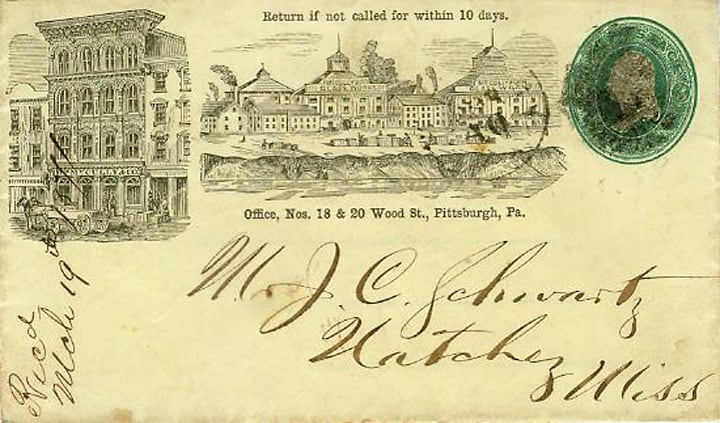
Postal cover and Illustrated advertising for Wm McCully & Co, glass works, postmark – Mar 11, 1871, Origin: Pittsburgh, Pennsylvania, Destination – Natchez, Mississippi
Manufactures of Glass.
Window glass was first made in the United States in the town of Pittsburgh, in 1795, at which time James O’Hara and Major Isaac Craig established a factory here. In 1802, General O’Hara made the first flint glass. From that day to the present, Pittsburgh has been the acknowledged centre of this class of manufactures, the artisans engaged keeping abreast of the world in improvements in styles and shapes, while leading all the rest in the matter of labor-saving machinery applicable to glass making and glass working. While for some years past there has been no great growth in the number of table-ware factories in the city, the productive capacity of those operated has been greatly augmented by the introduction of better forms of melting furnaces and appliances for the more rapid manipulation of the glass. In styles of ware produced our manufacturers are little, if any, behind the most famous foreign artificers, and every season brings radical advancement in this line. In fact, we are now supplying new shapes to both France and Austria, manufacturers in those countries having placed orders with our mold-makers and glass press manufacturers for molds and presses, and have engaged a number of Pittsburgh workmen to go over and instruct them in their use. Each of the leading flint table-ware factories now keeps an artist constantly employed in devising new designs, ranging through all classes of articles produced, so that there are novelties constantly offered to the trade. There are twenty-nine factories engaged in the production of flint and lime glassware, their specialties ranging from the highest forms of ornamental and table glassware to prescription vials, including such novelties as glass cloth, feathers, etc.
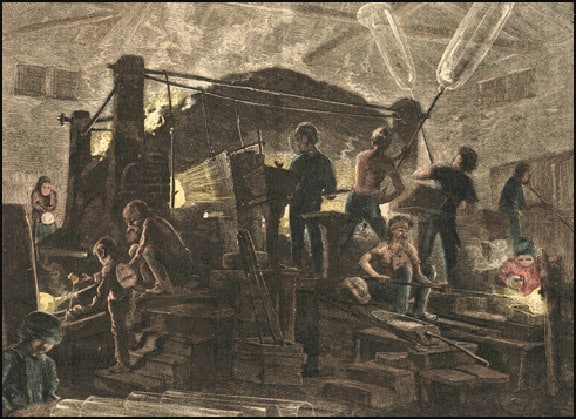
Illustration by Ralph Fenn, “Pittsburgh Sketches Among the Glass Worker,” Every Saturday , March 11, 1871
Of window glass factories proper, there are twenty-nine in operation in the city and suburbs, and one devoted to the manufacture of plate glass. The total product of these twenty-nine furnaces, with their 276 pots, has an annual value of $3,000,000. The output averages 3,400 boxes of fifty feet to each box, or 838,400 boxes of an average value exceeding $3 per box. Some of our Pittsburgh factories are making a fine article of window glass which is rapidly superseding the use of French cylinder glass in all the chief markets of the country. The Pittsburgh Plate Glass Company is having remarkable success in its specialty, and produces an article in every respect equal to the foreign plate glass. At this factory natural gas is used in all its processes, melting and annealing glass of remarkable purity and durability. Being the only Plate-Glass Company in the world using this wonderful production of nature, they are enabled, owing to its extraordinary heating power, together with its absolute freedom from sulphur and all other impurities, to produce an article which cannot be surpassed. Owing to the superior temper of glass annealed by this gas, it is not so liable to break, and consequently much more durable than that made by other processes. Experiments are also under way to test the practicability of its employment in window glass furnaces, its utility and superiority over coal in the flattening furnaces having already been demonstrated.
The manufacture of glass lamp chimneys has always occupied an important place in the general industry in this section, Pittsburgh furnishing at least seventy-five to eighty per cent” of the chimneys used in this country, besides exporting considerable quantities to Central and South America, Mexico and Cuba, in competition with the cheap labor of Europe. For a time factories multiplied rapidly and the market was largely overstocked, but this evil has now been overcome and the trade is in a healthful condition. The number of chimneys made here is estimated at 42,500,000 per year.
In glass bottles the consumption yearly shows a marked increase, but the capacity of the local factories is equal still to the demands upon them, which call annually for about 85,000,000 bottles and vials.
Flint and Lime Glass Factories – Adams & Co. (two factories), Agnew & Co., Hulton Glass Works; Atterbury & Co., Bryce Brothers, Bryce, Higbee & Co., Homestead Glass Works; Campbell, Jones & Co., Challinor, Taylor & Co., Crescent Glass Company, Crystal Glass Works, King, Son & Co., Dithridge & Co., Fort Pitt Glass Works; Doyle & Co., George Duncan & Sons,. Evans & Co., Excelsior Flint Glass Company, C. L. Flaccus, Independent Glass. Company, Lindsay Flint Glass Company, Limited, W. H. Hamilton & Co., J. T. & A. Hamilton, Robert Liddell, Gallatin Flint Glass Works; Wm. McCully & Co., Mastodon Glass Works; George A. Macbeth & Co., McKee Brothers, O’Hara Glass Company, Limited, Pittsburgh Glass Works, Phoenix Glass Company, Richards & Hartley Flint Glass Co., Ripley & Co., Rochester Tumbler Company, Tibby Brothers.
Window Glass Factories – Abel, Smith & Co., Crystal Glass Works; T. Campbell & Co., American Glass Works; A. & D. H. Chambers, Pittsburgh Glass Works; Cunningham & Co., Pittsburgh City Glass Works ; Ihmsen Window Glass Co., Limited, Birmingham Glass Works, Wm. McCully & Co., Empire and Sligo Glass Works; S. McKee & Co., Pennsylvania Glass Works; O’Leary, Bro. & Co., Phillips & Co., E. C. Schmertz, R. C. Schmertz & Co., Stewart, Estep & Co., Pittsburgh Union Glass Factories, George Wamhoff & Co., Thomas Wightman & Co., Penn and Eclipse Glass Works ; Wolfe, Howard & Co., Excelsior and Charleroi Glass Works.
Green and Black Bottle Glass Factories – Agnew & Brown, Glass Ball Works, Butler, Hitchcock & Co., Minnie Glass Works, A. & D. II. Chambers, Pittsburgh Glass Works; Cunninghams & Co., Pittsburgh City Glass Works; D. O. Cunningham, Ihmsen Glass Company, Limited, Wm. McCully & Co., Pittsburgh and Phoenix Glass Works ; Thomas Wightinan & Co., Penn and Eclipse Glass Works, Wormser & Co.
Capital invested, $6,470,000. Hands employed, 6,652. Value of product,. $7,500,000.
KINDS OF WARE MANUFACTURED.
Pressed flint and lime table and ornamental glassware, lamps and lamp chimneys, plate glass, window glass of all sizes and strengths, demijohns, bottles, vials, flasks, druggists’ ware, fruit jars, glass balls, insulators, and every description of glass.
Stained and Ornamental Glass – William Nelson, S. S. Marshall & Brother.
Capital invested, $100,000. Hands employed, 65. Value of product, $120,000.
There are fifteen firms devoted to the supply of materials and manufacture of molds, presses and other machinery pertaining to flint and lime glass manufacture, which employ an average of two hundred and twenty hands andarefitted up with all the most improved labor-saving machinery applicable to their purposes. They are gradually absorbing the business, and the day is coming when but few factories will maintain the old-fashioned ”mold shops,” where every thing was done from designing and making the molds for new forms of ware, to repairing old ones. In like manner each factory formerly made its own melting pots; but now nearly all buy them from the concerns devoted to their manufacture, which ship also largely of their product to factories outside.
In the matter of glass cutting, grinding, and ornamentation generally, the trade lias shown remarkable advancement during the past three years. Foreign workmen of the highest skill have been introduced, and such improvements made by our own inventive genius for these purposes which enable our factories to produce as artistic work in point of both design and execution as is sent out from the most celebrated factories of Europe. [Mercantile, Manufacturing and Mining Interests of Pittsburgh, 1884]


